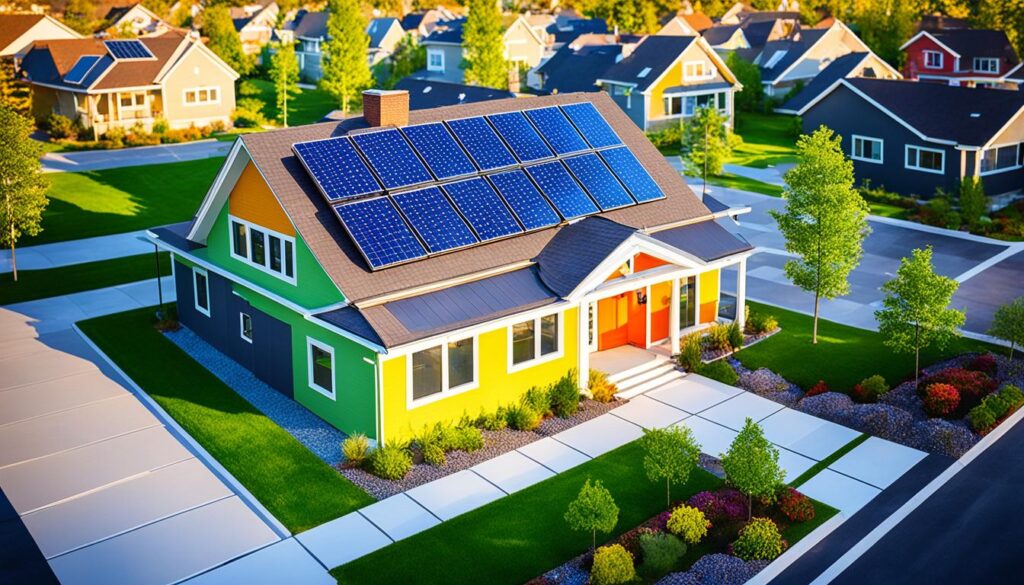The Ministry of New and Renewable Energy (MNRE) in India is taking big steps. They are increasing solar power adoption by boosting subsidies. Now, residential consumers choosing solar energy will get more help. Through the MNRE Solar Rooftop Portal, the subsidy has gone up by 23%. This change is key to India’s push for sustainable energy and a greener future.
Key Takeaways
- MNRE has increased solar rooftop subsidies by 23% for residential consumers
- This move aims to boost renewable energy adoption and reduce carbon footprint
- Grid-connected solar systems and net metering are encouraged
- Rooftop photovoltaics are becoming more accessible with increased solar rebates
- The initiative represents India’s commitment to a clean energy future
Harnessing the Power of MNRE Solar Rooftop Solutions
The National Solar Rooftop Portal is now offering 23% more subsidies to new home users. This move is a big step forward for those thinking about solar. It means lower upfront costs for solar panels, making them more attractive to people in India.
Understanding the MNRE Subsidy Boost
In today’s world, we face many environmental challenges. Solar energy promises a breakthrough due to its clean and sustainable aspects. By increasing solar subsidies, the MNRE aims to help reduce pollution and let individuals manage their energy usage better.
The Shift Towards Solar Power
This subsidy boost isn’t just about money. It’s a step towards less reliance on harmful fossil fuels. With more people opting for solar, India is advancing towards its green energy targets. This move is a vital part of the world’s battle against global warming.
Impact on Energy Landscape and Consumers
Thanks to better financial support and easier processes, more Indians will likely turn to solar. This choice will not only cut traditional energy use but also lead to a greener tomorrow. More solar-powered homes mean a significant change for India’s energy future.
mnre solar rooftop: Simplified Process for Residential Adoption
The MNRE has made applying for solar projects easier. They now need fewer documents. This change is part of an update to the rules. So, when you install rooftop solar, you only need to give your electric bill and a report on the project.
Smart Meters for Efficient Energy Management
The MNRE also told DISCOMs to keep smart meters in stock. These meters help by collecting data and can be monitored in real-time. This boosts the efficiency of installing solar on rooftops.
Affordability Through Increased Subsidies
Getting solar on your roof is now more affordable, thanks to the MNRE’s changes. They are giving more money to help with the cost. This means more people can use solar and save money on electricity bills. It’s a big step to encourage more solar use in India.
Conclusion: Embracing a Sustainable Future
MNRE in India is leading a solar power revolution. They are making it easier to set up solar panels on roofs. The government is also giving more financial support for this. Now, the country is on the path to a better and greener future. By the end of 2023, India had over 11 GW of solar power from rooftops. There’s a lot of room to grow, and MNRE is helping the country meet its big goals for renewable energy.
India is turning to solar energy to make tomorrow cleaner. Now, families everywhere are learning to save energy and reduce pollution. This change is not only good for our planet. It also makes clean power more affordable and available to more people. The country is getting greener and more energy independent because of solar power.
MNRE helps people and businesses use more rooftop solar. They are leading India to a future powered by clean, renewable energy. The country’s solar revolution is making amazing progress. India is inspiring the world in fighting climate change and working for a better, more sustainable future for all.
FAQ
What is the MNRE solar rooftop subsidy program?
The MNRE in India has upped the subsidy for home solar setups by about 23%. This move is to help more people go solar easily and cheaply. Homeowners throughout the nation can now enjoy better financial support to install solar.
How does the increased MNRE subsidy impact solar power adoption in India?
The 23% jump in subsidies for new home solar systems is a big deal. It cuts down the initial cost for installing solar panels, making it a wise choice for many. This financial help makes solar more popular in homes across the country.
What are the key benefits of the MNRE’s simplified application process for grid-connected solar projects?
MNRE’s simpler process for solar projects asks for less paperwork from consumers. Now, people only need to turn in their power bill and a project report. This change, along with making smart meters available, speeds up the process.
How do the higher MNRE subsidies make solar power more accessible for residential consumers?
By boosting the subsidy for home solar systems, more people can afford them. This support is set to increase the use of solar energy everywhere. So, the upgrade in financial help makes solar power an easy choice for anyone.

